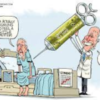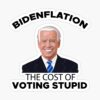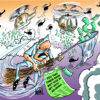EU leaders agree to Russian oil ban after compromise with Hungary
![]()
EU leaders agree to Russian oil ban after compromise with Hungary
EU says deal will effectively cut 90 percent of oil imports by year-end cutting off key source of Moscow’s funding for Ukraine war.

Published On 31 May 202231 May 2022
European Union leaders have agreed in principle to cut 90 percent of oil imports from Russia by the end of this year, cutting off a vital source of funding for Moscow’s invasion of Ukraine, after reaching a compromise deal with Hungary.
The 27-nation organisation has spent weeks haggling over a complete ban on Russian oil but encountered stubborn resistance from Hungarian Prime Minister Viktor Orban who said an embargo would destroy his country’s economy.
KEEP READING
list of 4 itemslist 1 of 4
Putin ready to facilitate export of grains from Ukraine: Kremlin
list 2 of 4
French journalist killed during Russian bombardment in Ukraine
list 3 of 4
Russia suspends gas deliveries to Dutch trader GasTerra
list 4 of 4
Biden: US will not send Ukraine rockets that can reach Russia
end of list
At a meeting in Brussels on Monday, leaders hatched a compromise deal to exempt deliveries arriving in Europe by the Druzhba pipeline.
“Agreement to ban export of Russian oil to the EU. This immediately covers more than two thirds of oil imports from Russia, cutting a huge source of financing for its war machine,” European Council chief Charles Michel said in a tweet at the end of the first day of a two-day leaders’ summit.
“Maximum pressure on Russia to end the war,” Michel added.
The head of the EU’s executive, Ursula von der Leyen, said the move “will effectively cut around 90 percent of oil imports from Russia to the EU by the end of the year” when Germany and Poland have promised to end deliveries via pipeline.
Two-thirds of the Russian oil imported into the EU is delivered by tanker and one third by the Druzhba pipeline. The embargo would reach 90 percent after Poland and Germany, which are also connected to the pipeline, stop taking delivery of Russian oil by the end of the year.
The remaining 10 percent will be temporarily exempt from sanctions so that Hungary, Slovakia and the Czech Republic, which are all connected to the southern leg of the pipeline, continue to have access to fuel they cannot easily replace.
“Russia has chosen to continue its war in Ukraine. Tonight, as Europeans, united and in solidarity with the Ukrainian people, we are taking new decisive sanctions,” French President Emmanuel Macron tweeted.
The compromise means other measures can also take effect, including disconnecting Russia’s biggest bank Sberbank from the global SWIFT system, banning three state broadcasters, and blacklisting individuals blamed for war crimes.
Sign up for Al Jazeera
Weekly Newsletter
The latest news from around the world.Timely. Accurate. Fair.Sign up

By signing up, you agree to our Privacy Policy
Zelenskyy’s criticism of the EU
In a video address to the summit earlier, Ukrainian President Volodymyr Zelenskyy chastised EU leaders for being too soft on Moscow.
“Why are you dependent on Russia, on their pressure, and not vice-versa? Russia must be dependent on you. Why can Russia still earn almost a billion euros a day by selling energy?” Zelenskyy said.
The EU has rolled out five rounds of




















